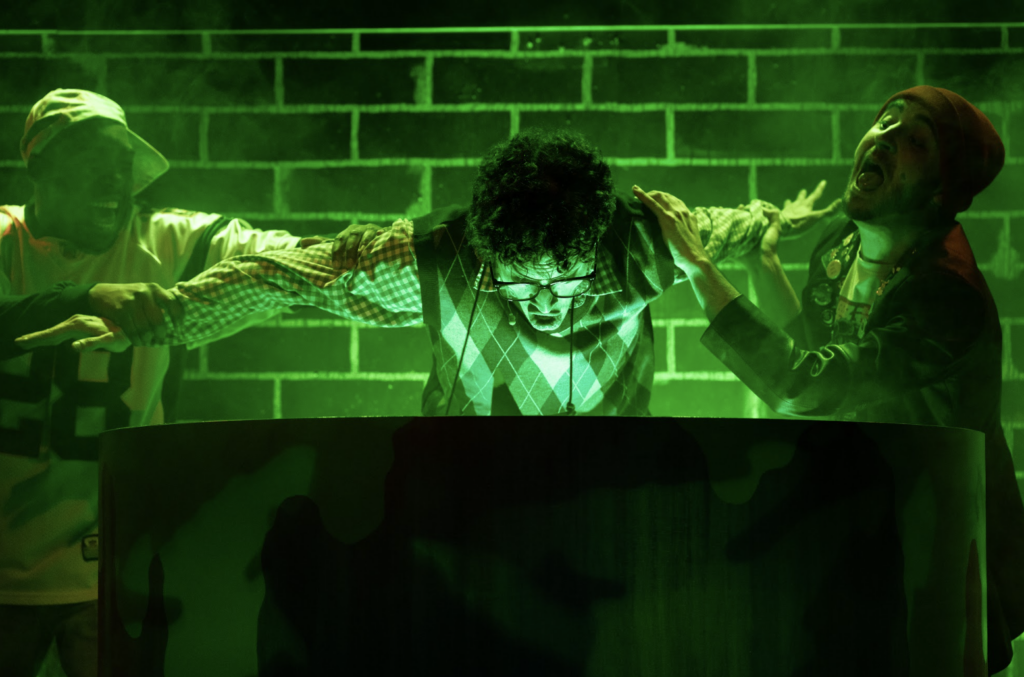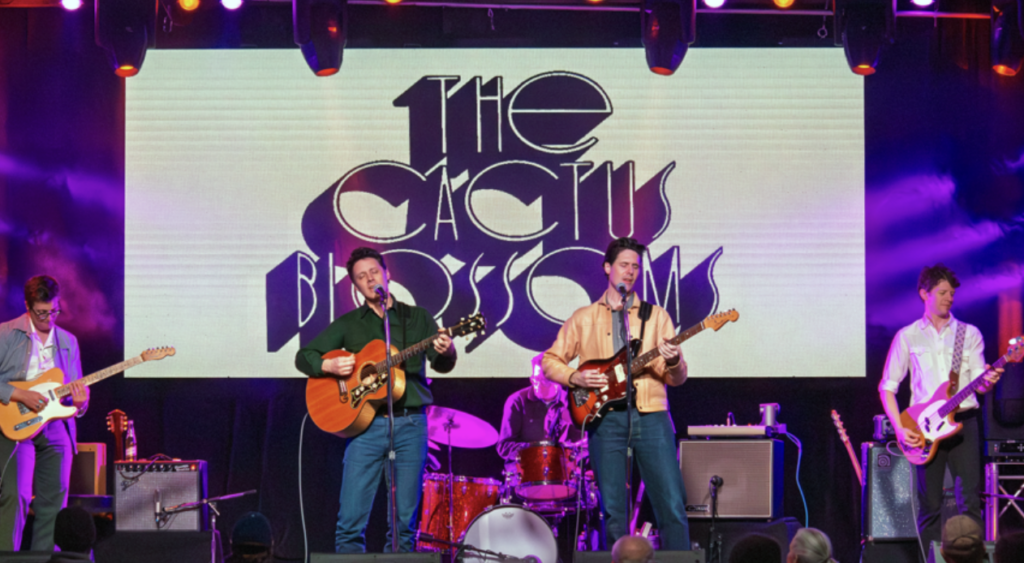No Skips: Michael Gira of Swans takes us track by track through The Beggar
In our series No Skips, we sit down with an artist or band and go track-by-track through their latest release. For some of us, the banter in a concert where a song gets explained is our favorite thing in the world, and we’d just like to keep living in that. Every song has a story, and these are those stories in the order you’ll encounter them on the record.
Experimental veterans Swans have played the KC area just three times during their 31-year career. Just before the beginning of their current U.S. tour on April 12, we caught up with frontman Michael Gira to discuss every track on latest album The Beggar, and what to expect from their show on May 9 at recordBar.
The Pitch: As a major fan of The Seer, I have to ask—Are there sounds at the end of “The Parasite” that are borrowed from “Apostate?” If not, how did they originate?
Gira: No, the sounds were not taken from “Apostate.” I’m not exactly sure what you’re referring to, but the various sounds in that song are ebo-ed lap steel guitar, female vocals, synthesizer, mellotron, bass, acoustic guitar.
Is “I wonder if your breathing is stealing all the air” possibly a play off a similar line in “Oxygen?” Are these things you are conscious of when writing or is playing on similar themes just a part of being an artist?
I wasn’t aware of that. Those two songs have nothing to do with each other.
“Paradise is Mine” feels like a true trance song. Why was this the choice for the first single?
I don’t remember why I chose it. Probably because it had a more straightforward rhythm than other possible choices. I admit that the idea of it being a single is rather ridiculous.
Are you diving into metaphysical solipsism in this track? What are you channeling with the questions in the refrain?
I think I had it in mind that those are the most important questions one can ask oneself, especially when they are aware of how finite their existence is.
I saw you said that “Los Angeles: City of Death” was inspired by Day of the Locust. Is this a major art piece for you?
I don’t believe it was inspired by that book, but the Los Angeles of my memory and dreams invoked it for me afterwards, while thinking about the song.
There are some lines, early on, speculating diseases to the body. I am assuming this track is about the end of a life?
On the contrary, every song is an invocation of the positive force buried inside a life.
I’m going to guess that Michael refers to you in “Michael Is Done.” What led you to put yourself very distinctively in one of your songs? The lyrics here feel like lived-in experiences and are the most specific yet on the record.
Actually the song was initially called “Julie is Done,” but I changed it to “Michael is Done,” because Julie seemed like a silly name to have in a song. To me, the song is a conundrum, consciousness grinding against itself, chewing itself.
The instrumental section is reminiscent of “Song for the Sun.” Do you think of material you already have when creating something new?
I suppose it’s inevitable that some of the music would evoke music from the past, especially after over 40 years of making music, but it’s not intentional.
“Unforming” talks a lot about freedom from any kind of fear. Why is this something you feel compelled to talk about, and why did you place the track here on the record?
I place songs on the albums based on the inherent dynamics between song to song.
There is a line people are theorizing as a reference to an epitaph of John Keats here.
That sounds like a fine reference, but I’m not aware of that, sorry.
I wanted to talk about the scream in “The Beggar.” It’s awesome. Why here?
Thank you. Frankly, that section seemed underwhelming while mixing the song, and I had the engineer set up a mic and I did it spontaneously.
Walk me through the guitar part and vocal distortion in the final two minutes of that track, immediately after the scream.
These things develop organically and intuitively in the process of working. I’m afraid I don’t remember.
I have heard you have a 30-minute version of this track that you play live. How did this come about? Was the song originally that long and you cut it down because of the length of “The Beggar Lover (Three)?”
Live, our material grows of its own accord through performance and improvisation. In the case of “The Beggar,” it has now morphed into an entirely new piece of music and we’ve just recorded it in Berlin with new words.
Where did the final verse of “No More of This” come from? It’s one of the best things you’ve done.
Thank you. The character in the song is saying goodbye to his loved ones.
This feels like the most simple song on the record. Some tracks are pretty clear (“Michael Is Done”). What was your intention with that, given that Swans typically skews toward more cryptic material?
I follow what seems true and necessary at the time.
Talk about the happy choral compositions in “Ebbing.” Why were they important for this song and at this point on the record?
The song invoked that arrangement. These things aren’t planned per se. Once I hear a basic recording, it calls out for certain sounds and I supply them.
A very long instrumental outro for this one. How did you come up with it and how do you guys normally formulate long instrumentation sections as a band?
Again, it just grew naturally in the process.
I noticed that you said “Why Can’t I Have What I Want Any Time That I Want?” is about your struggles with alcohol. Why was this important for you to talk about now given you said you are far removed from it?
I don’t like talking about my personal life, but in this case, the selfish ID that the song deals with seems to be universal, so I felt comfortable following the trajectory of that lyric.
How often do you see people misconstrue your songs? Is this annoying to you?
It’s inevitable and not worth worrying about.
What makes the sound in “The Beggar Lover (Three)” an obsession for you? I saw you said you are really into that type of sound right now and that it was the main influence on why you wanted to make the song. This track has little in common with everything else here.
I just dove in and made that piece with what I had at hand. Each sound evoked other sounds and contexts, and it was just a matter of following the directions the music gave me.
How were specific tracks chosen as callbacks for “The Beggar Lover” and how long did it take to figure all of that out?
Haha. It took a lifetime. Again, it was all done by following intuition.
It’s 43-minutes long. How do you know when you’ve gone too far, Michael?
I don’t worry about that. Too far for whom? I don’t have to please anyone, even myself. I’m a slave to what the work itself demands.
“The Memorious” is based on the short story, “Funes the Memorious,” from Jorge Luis Borges. Describe that connection.
It’s a beautiful story in which the character is plagued with remembering everything. In my case, I forget everything, routinely, so I thought that contrast was interesting.
I saw some theories that certain lines from this track could possibly be about your time working in a copper mine in Israel. Is this accurate?
Since the song was about memory, I referenced a few of my own memories, but that they are mine is unimportant.
Knowing your live shows are a showcase for newly unreleased material, what is a song that you are most excited to debut to audiences?
Not really a showcase. We develop new material live with an audience in attendance. In that way we feed each other.
Can we expect to ever hear any tracks from The Seer in a live setting ever again?
No, sorry. We only play current material, or material that’s in development. Not interested in reliving the past.
Swans play recordBar on Thursday, May 9, with opener Kristof Hahn. Details on that sold out show here.





